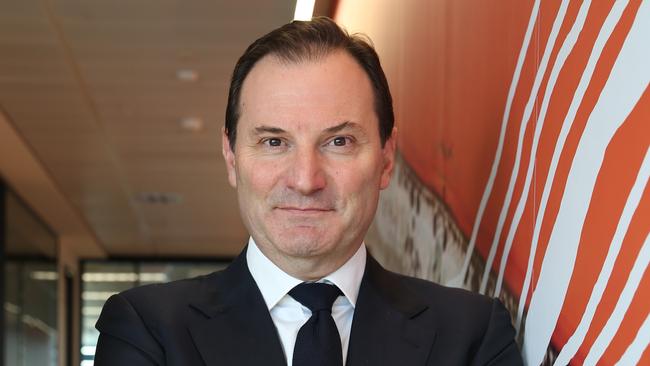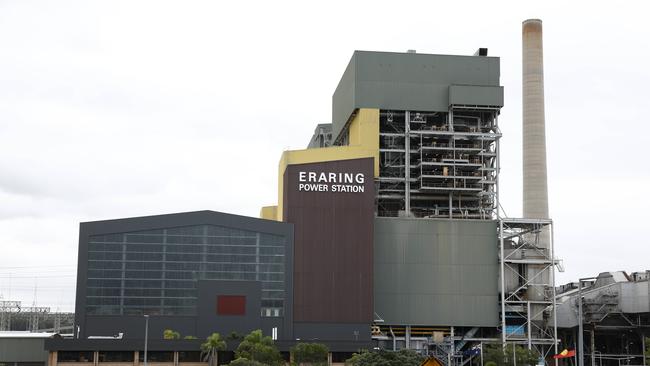Origin Energy warns costs and public support are inhibitors to nuclear
A public debate about the community acceptance of nuclear will be vital as the Coalition pushes plans for the technology rollout, Origin boss Frank Calabria says.

The Coalition’s nuclear strategy will have to overcome high costs and community acceptance if it is to play a part of the country’s future National Electricity Market, Origin Energy chief executive Frank Calabria has warned.
The comments underscore the significant challenges that the Coalition will need to overcome if it to implement its signature energy policy, which is says will reduce the toll of the transition net zero by 2050 on households and businesses.
Mr Calabria said the industry is agnostic to technologies underpinning the country’s electricity market, but said nuclear has some sizeable hurdles, and it does not offer an immediate solution.
“There’s obviously also the public debate that’s going to go on about the acceptance of nuclear, and we would have to watch that as well. We’re not in control of that,” said Mr Calabria.
“The experience today around the world if you’re building a new one, it’s very expensive, but there are now new modular technology around the technologies that are being certainly development and research and that’s going to be something that continues, and we all look at that with interest.”

Opposition leader Peter Dutton has flagged seven potential sites, including AGL Energy’s Liddell Power Station in NSW and Loy Yang in Victoria and EnergyAustralia’s Mount Piper Power Station in NSW. The Coalition has also earmarked Western Australia’s Collie Power Station and South Australia’s Northern facility and Callide and Tarong in Queensland.
Australia’s energy industry has been careful to comment on the proposal amid concern of alienating a potential future government, but AGL Energy has rebuked the suggestion.
The most directly impacted companies did not immediately respond to the proposal, but AGL’s chief executive Damien Nicks In March said nuclear was not viable.
“There is no viable schedule for the regulation or development of nuclear energy in Australia, and the cost, build time and public opinion are all prohibitive,” Mr Nicks said.
“AGL’s ambition to add 12GW of new renewable and firming generation by 2035 does not include nuclear energy. Policy certainty is important for companies like AGL and ongoing debate on the matter runs the risk of unnecessarily complicating the long-term investment decisions necessary for the energy transition.”
While AGL has vowed to push ahead with its renewable energy strategy, Australia faces a looming shortfall.
The Australian Energy Market Operator estimates that the country’s coal power station fleet is likely to have been retired within 15 years, a fact acknowledged by Mr Calabria.
“We’ve got coal plants that are coming to very long into their lives, so we can talk about years, but they’re not going to be there,” Mr Calabria said.
“For decades, we are going to have a coal transition, but that’s all around timing. And so therefore, what we’re doing is, therefore having to make the investments and navigate that as a country to achieve what’s the best blend of technologies that does that?”
While Australia’s energy industry has been considered, Treasurer Jim Chalmers slammed the Opposition’s energy policy as the “dumbest policy ever put forward by a major political party” and accused the Coalition of “ideological stupidity”.
He said the Albanese government’s policy “couldn’t be more different to the economic madness, which is being peddled by our opponents today”.
“We are expecting to hear a bit more about the Coalition’s nuclear road to nowhere.
“With Australia’s advantages and opportunities, nothing could be more economically irrational, or fiscally irresponsible. Nuclear takes longer. It costs more, and it would waste Australia’s unique combination of geological, geographical, geopolitical and media illogical advantages.
“It might be the dumbest policy ever put forward by a major political party. It is the worst combination of economic and ideological stupidity.”
Energy now shapes as a defining theme of the election due by May 2025, with a diametrically opposed strategies threatening to create more policy uncertainty.
Mr Calabria said there was “certainly more” certainty today than five years ago as to the government’s position on renewable energy but said clarity was needed on the federal Labor’s centrepiece Capacity Investment Scheme.
“There’s certainly more in terms of where they want those renewable zones to be constructed and where they will be built,” he said. “And there’s more certainty in our role now … as you approach timing, and we’ve just committed for a gigawatt of batteries to be installed on our existing sites, and we see those have matured as being part of a solution.
“I think there are still some things that need to happen in terms of timing on transmission, timing on when those builds will occur. And probably the capacity investment scheme is the key one where they’ve announced that scheme, but we’re just waiting. More details need to be developed.”






To join the conversation, please log in. Don't have an account? Register
Join the conversation, you are commenting as Logout